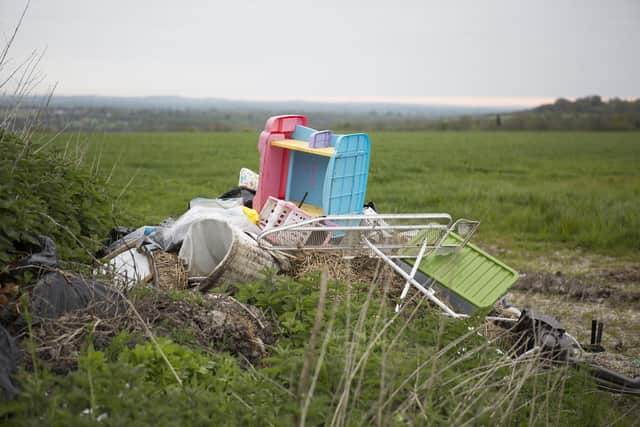Cases of winter fly-tipping on the decline in Doncaster - bucking the Yorkshire trend
and live on Freeview channel 276
According to the Department for the Environment, Food and Rural Affairs (DEFRA), a total of 90,055 fly-tipping incidents were recorded across the region in 2020/21, with, incidents on agricultural land increasing, year-on-year, from 420 to 489.
However in Doncaster there is better news as cases have dropped from 1,373 to 1,177.
Advertisement
Hide AdAdvertisement
Hide Ad“Fly-tipping is an unwelcome blight on our countryside and can represent far more than an inconvenience to victims of the crime,” said Rupert Wailes-Fairbairn, of rural insurance broker Lycetts.


“Incidents not only pose significant environmental and human health risks, but also a legal and financial burden for farmers and landowners.
“Although local authorities will usually pay the clean-up costs of clearing waste from public land, the responsibility for removing waste from private land falls squarely at the feet of the landowners. If they fail to do so, they can face prosecution.”
Clean-up bills per incident average around £1,000, according to the National Rural Crime Network, but large-scale incidents can cost upwards of £10,000. Wailes-Fairbairn, however, explained that farm businesses can insure the risk.
Advertisement
Hide AdAdvertisement
Hide Ad“In some cases, farmers can be repeatedly targeted and costs can quickly escalate,” he said.
“Many combined farm policies, however, will cover the clean-up costs, typically capped between £10,000 and £15,000 for the insurance period.”
Wailes-Fairbairn pointed out that environmental criminals can be more inclined to act under cover of darkness and that councils will often see a surge of incidents in January as people look to dispose of post festive waste, including Christmas trees.
“For those at risk of being targeted during these dark winter evenings, extra vigilance and a review of security measures is prudent,” he added.
Advertisement
Hide AdAdvertisement
Hide Ad“Prevention is better than cure and steps should be taken to ensure access to land and fields is restricted, where possible, with physical barriers.
“Gates should be locked when not in use and although witnesses of fly-tipping incidents should not approach the perpetrators, by cutting back hedges and installing exterior lighting, visibility for the landowner can be notably improved. The installation of security cameras can also act as a deterrent and help in securing successful prosecutions.”
In these confusing and worrying times, local journalism is more vital than ever. Thanks to everyone who helps us ask the questions that matter by taking out a subscription or buying a paper. We stand together. Nancy Fielder, editor.
Comment Guidelines
National World encourages reader discussion on our stories. User feedback, insights and back-and-forth exchanges add a rich layer of context to reporting. Please review our Community Guidelines before commenting.
